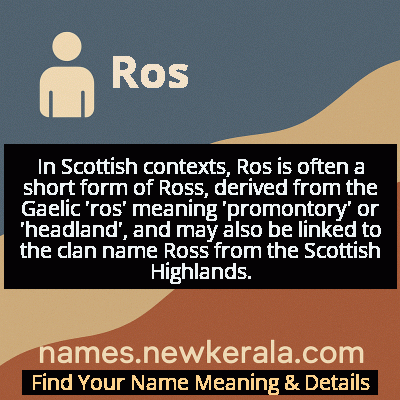Ros Name Meaning & Details
Origin, Popularity, Numerology Analysis & Name Meaning of Ros
Discover the origin, meaning, and cultural significance of the name ROS. Delve into its historical roots and explore the lasting impact it has had on communities and traditions.
Name
Ros
Gender
Male
Origin
Scottish
Lucky Number
7
Meaning of the Name - Ros
In Scottish contexts, Ros is often a short form of Ross, derived from the Gaelic 'ros' meaning 'promontory' or 'headland', and may also be linked to the clan name Ross from the Scottish Highlands.
Ros - Complete Numerology Analysis
Your Numerology Number
Based on Pythagorean Numerology System
Ruling Planet
Neptune (Ketu)
Positive Nature
Intuitive, analytical, spiritual, and inquisitive.
Negative Traits
Secretive, reserved, aloof, and can be overly critical.
Lucky Colours
Green, yellow.
Lucky Days
Monday.
Lucky Stones
Cat’s eye, moonstone.
Harmony Numbers
1, 5, 6.
Best Suited Professions
Scientists, researchers, spiritual leaders, detectives.
What People Like About You
Depth of knowledge, analytical skills, spirituality.
Famous People Named Ros
Ros Canning
Scottish footballer
Professional footballer who played for Scottish clubs including St Mirren and Morton during the 1960s-1970s
Ros Kelly
Australian politician
Former Australian Minister for Defence Science and Personnel and Member of Parliament for Canberra
Ros Turnbull
Scottish rugby player
Professional rugby union player who represented Scotland in international competitions
Name Variations & International Equivalents
Click on blue names to explore their detailed meanings. Gray names with will be available soon.
Cultural & Historical Significance
The cultural significance extends beyond mere geography into Scottish identity and resilience. During the Highland Clearances, many Ross families were displaced from their ancestral lands, making the name a symbol of both lost heritage and enduring Scottish spirit. In literature and folklore, names derived from geographical features like Ros often carried meanings of stability and connection to ancestral lands. The name appears in various historical records dating back to the 12th century, particularly in northern Scotland where the geography matches the name's meaning. Today, Ros serves as a living connection to Scotland's Gaelic past and the enduring relationship between the Scottish people and their dramatic, coastal landscape.
Extended Personality Analysis
Individuals named Ros are often perceived as grounded, stable, and deeply connected to their roots, much like the geographical features their name represents. They tend to possess a strong sense of identity and loyalty, characteristics that mirror the steadfast nature of headlands standing firm against the sea. Typically practical and reliable, Ros's are known for their methodical approach to problem-solving and their ability to provide support during turbulent times. Their connection to land and heritage often makes them traditional yet adaptable, able to navigate change while maintaining core values.
Many Ros's exhibit natural leadership qualities combined with a quiet determination, making them respected figures in their personal and professional circles. They often value family history and cultural traditions, carrying forward legacies with pride and responsibility. The geographical symbolism of their name suggests someone who can see the 'big picture' while remaining firmly grounded - much like a headland offering panoramic views while being solidly connected to the mainland. Friends and colleagues typically describe Ros as dependable, thoughtful, and possessing an inner strength that becomes apparent during challenging situations. Their calm demeanor often masks a deep emotional intelligence and strong protective instincts toward those they care about.
Modern Usage & Popularity
In contemporary times, Ros remains a relatively uncommon but culturally significant name, primarily used in Scotland and among Scottish diaspora communities. While it peaked in popularity during the mid-20th century, it has seen a modest revival in recent years as parents seek traditional Scottish names with strong heritage connections. The name maintains its masculine identity despite the rise of similar-sounding feminine names like Rose. Modern usage often sees Ros used as both a standalone name and as a shortened form of longer names like Ross or Roscoe. According to naming statistics, Ros appears more frequently in Scotland and Northern England than other regions, maintaining its geographical and cultural ties. The name's simplicity and strong Scottish identity contribute to its enduring, though niche, appeal among parents looking for names that are both traditional and distinctive without being overly common.
Symbolic & Spiritual Meanings
Symbolically, Ros represents stability, permanence, and connection to one's origins. Like a peninsula that extends into the sea while remaining connected to the mainland, the name embodies the idea of exploration and adventure grounded in strong foundations. It symbolizes the meeting point between land and sea - a place of transition and perspective, suggesting someone who can bridge different worlds or viewpoints. The geographical origin also carries metaphors of resilience, as headlands withstand the constant battering of waves and weather. In Celtic symbolism, promontories were often considered sacred spaces - liminal areas between earth and water, making the name Ros carry connotations of spiritual connection and natural wisdom. The name evokes images of rugged Scottish coastlines, representing both strength and beauty in its simplicity, and serving as a reminder that true strength comes from being firmly rooted while reaching toward new horizons.

